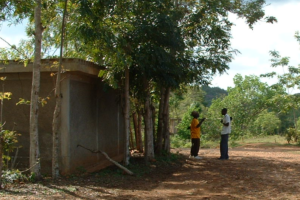 Some of my earliest trips to Haiti were as a member of a teacher-training team. We conducted two-week programs for elementary and high school teachers, aimed to fill gaps in subject matter and methodology resulting from 200 years of isolation and poverty.
Some of my earliest trips to Haiti were as a member of a teacher-training team. We conducted two-week programs for elementary and high school teachers, aimed to fill gaps in subject matter and methodology resulting from 200 years of isolation and poverty.
One year, a lot of things went wrong. The workshops were free to the teachers but before we arrived, a local organizer had collected and pocketed tuition from all the participants. There was also a misunderstanding about the cost of our housing which came to a head when the owner of the guesthouse held our laundry hostage.
My classroom had an additional layer of chaos because I was teaching my classes in Haitian Creole instead of in French. Except that I didn’t speak Creole. The previous year, my first year, when the class was in French, everybody in the classroom was operating in a foreign language. My logic was that if we all spoke Creole, only one person in the room would be struggling with a foreign language. I hadn’t come to Haiti to improve my French anyway.
I was teaching math. There were 40 students. Each day we did a different hands-on activity in groups, using available materials, like pebbles, folded paper, or a string compass. I always asked the same questions. What do you observe? What questions does this raise? Can you answer them? How do you know you are right? Why is this math?
I started each class by explaining the steps of the day’s activity and writing them on the board. Then I would ask if anyone understood what I had said. Usually it took some discussion for them to piece together what they were supposed to do and correct the sentences I had written. They set to work. I wandered from group to group, asked a few questions, and listened to them talk.
By the middle of the second week, tensions were high. Even though I couldn’t follow the details, I knew that some of the spirited classroom discussions were about that tuition money. I had no clean clothes. Some of the other teachers were having meltdowns. Students fell asleep in class because they were hungry.
One evening on the street, feeling dispirited and ineffective, I ran into a man from one of my classes, an animated, voluble person. Words flowed out of him, roiled down his fluid gesticulating arms and washed all over me. The gist of his speech was that my class was a wonderful, life-changing experience.
Yeah, right, I thought.
“Just tell me one thing,” I said. “One thing. That you’ll do different when school starts because you were in this class.” My limited language skills couldn’t communicate how sarcastic I felt.
He drew in all his limbs and spoke in even tones. “Well actually, there are 3 things,” he said, and began ticking them off on his fingers. “Three things I am going to do differently. First, when I talk to a student who is sitting in their desk, I am going to do what you do and squat down next to them so we see one another face-to-face. Second, I am going to allow myself to smile. And third, I am going to play with the students at recess.”
Three things. If I had been able to talk better, he might have known I was speechless.